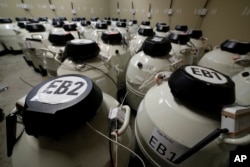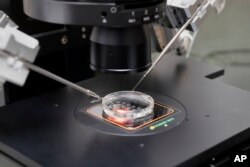The issue of reproductive rights was always going to loom large in the 2024 U.S. elections, with the country still seeking a new equilibrium after the Supreme Court eliminated the federal right to an abortion in 2022.
However, a controversial ruling by the Alabama Supreme Court that some interpret as questioning the legality of in vitro fertilization (IVF) threatens to supercharge the issue and is forcing Republicans to clarify their position on the popular procedure, which allows couples struggling with fertility problems to become parents.
In the wake of the ruling, many prominent Republicans, from former President Donald Trump to senior leaders in Congress, have come out in support of in vitro fertilization, in which human eggs are fertilized outside the body before being implanted in the mother’s uterus.
But some are struggling to square that claim with previous sponsorship of bills that suggest a fundamental agreement with the Alabama court’s finding, which held that eggs fertilized during IVF have the same legal status as human children.
'Sanctity of life’
The Alabama case involves a wrongful-death lawsuit filed by customers of an Alabama in vitro fertilization clinic whose frozen embryos were accidentally destroyed. In the majority opinion, the majority-conservative court ruled that the clinic was liable because the state’s existing Wrongful Death of a Minor Act “is sweeping and unqualified. It applies to all children, born and unborn, without limitation.”
In a concurring opinion, Alabama Chief Justice Tom Parker stressed the religious aspects of the court’s decision, writing that existing Alabama law includes a “theologically based view of the sanctity of life.”
Parker wrote, “Carving out an exception for the people in this case, small as they were, would be unacceptable to the People of this State, who have required us to treat every human being in accordance with the fear of a holy God who made them in His image.”
The impact of the law was that fertility clinics around the state providing in vitro fertilization immediately stopped offering those services. The process of in vitro fertilization often involves the fertilization of a number of eggs, not all of which are necessarily implanted in a woman. Under the court’s ruling, the destruction of non-implanted embryos, whether intentional or accidental, could leave the clinic vulnerable to wrongful-death claims.
‘Fodder’ for political attacks
In a memo to Republican Senate candidates, Jason Thielman, executive director of the National Republican Senatorial Committee, called the Alabama ruling “fodder for Democrats hoping to manipulate the abortion issue for electoral gain” and urged Republican candidates to repudiate it.
“There are zero Republican Senate candidates who support efforts to restrict access to fertility treatments,” he wrote. “NRSC encourages Republican Senate candidates to clearly and concisely reject efforts by the government to restrict IVF.”
Indeed, the Democratic National Committee pounced on the Alabama ruling, issuing a string of press releases in the days after it was released, blaming Republican leadership for creating a climate in which such decisions may become more common.
“Donald Trump is the reason why cruel abortion bans across the country are ripping away women’s reproductive freedom and threatening access to IVF for Americans trying to start a family,” DNC spokesperson Rhyan Lake said in one release.
It was Trump’s appointment of three anti-abortion-rights Supreme Court justices that shifted the ideological balance on the court sufficiently to bring about the 2022 ruling in Dobbs v. Jackson Women’s Health, which overturned the 1973 ruling in Roe v. Wade that guaranteed the right to an abortion in the U.S.
Republicans vow support for IVF
Many high-profile Republicans have gone on the record to support IVF treatment. In comments delivered in South Carolina last weekend, Trump said he would “strongly support the availability of IVF” if elected.
“Under my leadership, the Republican Party will always support the creation of strong, thriving, healthy American families. We want to make it easier for mothers and fathers to have babies, not harder,” he said.
“I believe the life of every single child has inestimable dignity and value,” House Speaker Mike Johnson said in a statement. “That is why I support IVF treatment, which has been a blessing for many moms and dads who have struggled with fertility.”
However, Democrats quickly pointed out that Johnson was a sponsor in 2023 of the Life at Conception Act, which would have declared fertilized eggs as human beings with legal protections and included no exception for eggs fertilized during IVF treatment.
‘Personhood’ push
The Life at Conception Act is one of a number of proposals being pursued by Republicans around the country that would expand the legal definition of a human being to include fertilized eggs.
Kimya Forouzan, a principal policy associate for state issues at the Guttmacher Institute, a nonprofit research organization supporting reproductive rights, said that such legislation has become more frequent in recent years.
“It's hard to know what exactly will happen next, but we do know that this push towards personhood has existed for a long time, and it's really just ramped up since the Dobbs decision,” she told VOA. “The focus on abortion has continued to expand even further to include things like IVF.”
While no courts in states other than Alabama have issued similar opinions, there are a multitude of state laws either pending or on the books that take an expansive view of the concept of “personhood” and that could be interpreted similarly.
Possible overreaction
While a number of anti-abortion-rights organizations have praised the ruling, some experts in the movement argue that the interpretation of the court decision as threatening the overall legality of IVF treatments is being overblown.
“What the ruling says is that for the purpose of a wrongful-death-of-a-minor lawsuit, the frozen embryos are considered a person,” said Emma Waters, a senior research associate with the DeVos Center for Life, Religion and Family at the Heritage Foundation, a conservative think tank in Washington.
“The ruling does not say, for example, that no embryos can be destroyed,” Waters told VOA. “And it doesn't even necessarily say that all embryos have personhood status. It simply says that for the purpose of the Wrongful Death of a Minor Act, which is what the parents were suing under, the embryonic children in question are conferred personhood status.”
Danielle Pimentel, policy counsel at Americans United for Life, agreed that the ruling is more circumscribed than many of its opponents contend. For example, she said, if a couple undergoing successful IVF treatment give permission to the clinic to discard unused embryos, there is no cause of action under the Wrongful Death of a Minor Act.
“The Alabama Supreme Court decision does not limit IVF or access to IVF,” Pimentel told VOA. “It simply ensures that both the parents and their embryonic children are protected, and that fertility clinics are not acting negligently when they're in possession of these embryonic children.”







